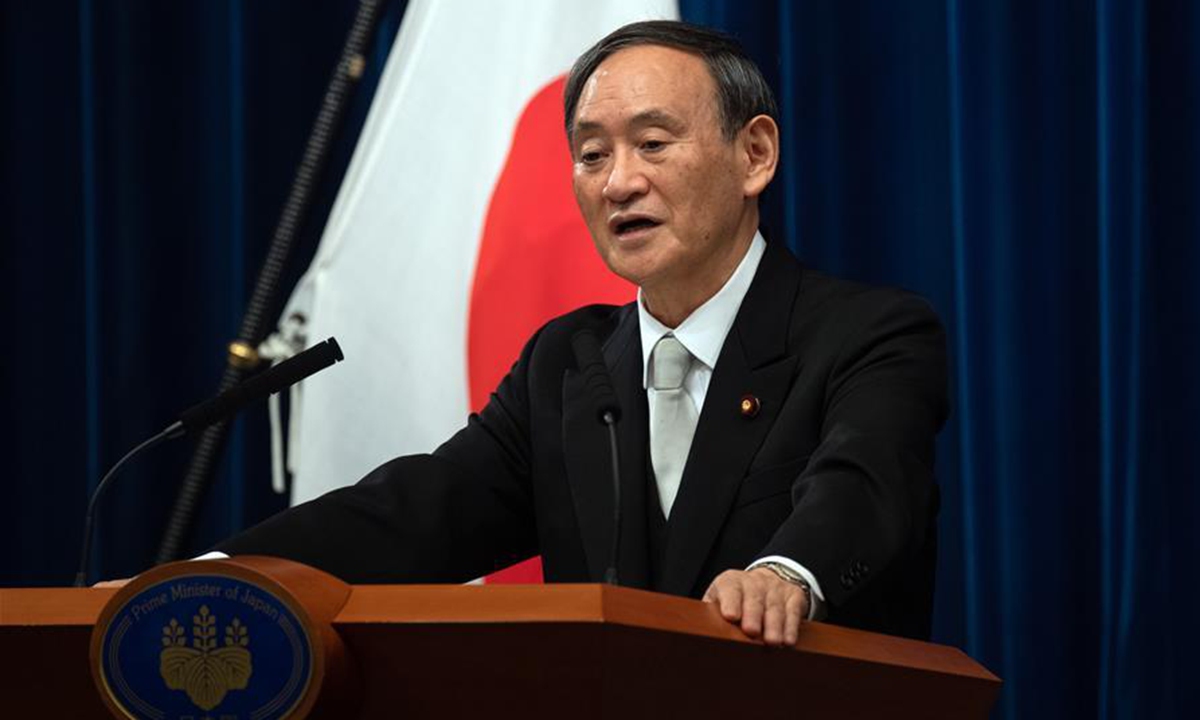Suga’s first diplomatic trip to Southeast Asia masks larger agenda
By Chen Yang Source: Global Times Published: 2020/10/14 18:58:40

Yoshihide Suga Photo: Xinhua
According to a report by the Kyodo News on Tuesday, Japanese Prime Minister Yoshihide Suga said in a meeting with his Liberal Democratic Party (LDP) he considered that his planned trip to Vietnam and Indonesia is of great importance in promoting an open and free Indo-Pacific region, with centrally located ASEAN playing a key role in the initiative.These words carry extra weight ahead of Suga's upcoming four-day visit to Vietnam and Indonesia starting Sunday.
After taking office, most of Japan's newly installed prime ministers would immediately side with the US to consolidate their ruling foundation and visit Washington first accordingly. Of course, there are exceptions. For example, Shinzo Abe, Suga's predecessor, visited Southeast Asia first instead the US after taking office again in 2012. However, the move has not at all affected the development of the US-Japan relations under the Abe administration. Indeed, Abe had become one of US President Donald Trump's most trusted foreign leaders.
After Suga was elected as prime minister in September, his first overseas call was not made to Trump. Nor is he choosing the US for his first overseas trip. But this does not mean that Suga has lowered the importance of the US and the US-Japan alliance. It was because of the severe COVID-19 epidemic in the US and concerns about Trump's reelection.
Since the end of World War II, Japan has always attached great importance to Southeast Asia, making early diplomatic and economic inroads. Beginning in the early 1950s, Japan used "war reparations" as a means to improve its relations with the countries in the region, followed by the opening of diplomatic missions.
With its rapid economic development in the 1960s, Japan established close economic relations with Southeast Asian countries through trade, investment and official aid. In the 1960s, Japan was the largest trading partner of many Southeast Asian countries. Japan actively developed its relations with Southeast Asia by means of economic and trade assistance in order to seek the support of Southeast Asian countries for political and security purposes.
Today, Southeast Asia has become a region with the greatest development potential in the world. It has an ample young labor force, rapid economic growth, and huge consumer market. Japan, suffering from both COVID-19 epidemic and economic calamity, now seeks to further deepen its ties with Southeast Asia. This will not only help the current economic recovery, but also contribute to the rapid development of the Japanese economy in the post-pandemic era.
Setting aside historical factors of Japan and Southeast Asia after WWII, Suga is making Southeast Asia his first diplomatic visit for certain practical reasons. In the context of the overall decline of China-US relations, Suga's trip to Southeast Asia will be, to some extent, in line with the US' regional strategy.
During the recently concluded Quadrilateral Security Dialogue among the US, Japan, India, and Australia in Tokyo, the foreign ministers of the four countries reiterated their firm support for ASEAN and the ASEAN-led regional framework. They also threw their full support behind ASEAN's "Outlook on the Indo-Pacific."
As a loyal ally of the US with enormous influence in Southeast Asia, Tokyo undoubtedly needs to cooperate with Washington's China containment policies. Therefore, it is expected that Suga will raise the South China Sea issue during his visit to Vietnam and Indonesia. He may also seek to strengthen cooperation between Japan and ASEAN in maritime security and further implement the Indo-Pacific Strategy.
Today, China and ASEAN are each other's largest trading partners. This underlies increasingly close bilateral economic and trade relations. It gives impetus to China-ASEAN cooperation under the China-proposed Belt and Road Initiative. As for the fruitful economic and trade achievements between China and Southeast Asian countries, it will be difficult for Japan to catch up easily in a short period of time. At present, Japan can only "attach great importance" to enhancing its relations with Southeast Asia through diplomatic etiquette.
Therefore, in the context of the current epidemic and economic conditions, Japan cannot easily replace China's position in ASEAN. Nor can it achieve expected results only through Suga's visit to Southeast Asia. Last but not least, Southeast Asian countries do not want to become targets for the strategic competition among major powers.
The author is a media professional and a Beijing-based Japan watcher. opinion@globaltimes.com.cn
Posted in: VIEWPOINT,ASIAN REVIEW